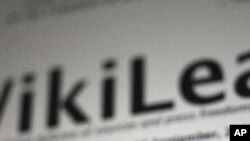The activist website WikiLeaks and several media partners have published a collection of nearly 400,000 secret U.S. military documents from the Iraq War, providing new details of well known issues, including civilian casualties, detainee abuse and meddling by Iran.
The Pentagon has condemned the release, saying it puts Americans and Iraqis in danger, and could hamper military operations.
The WikiLeaks documents indicate thousands more Iraqi civilians may have died in the war than the U.S. government has acknowledged, but says the vast majority of them died at the hands of fellow-Iraqis in a bloody surge of sectarian violence several years ago.
Still, the New York Times, which was one of four news organizations given access to the documents weeks ago, says they reveal several previously unreported incidents in which U.S. troops unintentionally killed civilians at checkpoints and in helicopter strikes.
(The other media outlets are Britain's Guardian, France's Le Monde and Germany's Der Spiegel.)
The Times says total figures for civilian casualties are difficult to tabulate because some deaths may be reported more than once, but it says in all the documents appear to detail the deaths of more than 100,000 Iraqi civilians.
The documents are raw battlefield reports from small units to their commanders and cover the period from late 2003 until earlier this year.
The reports accuse Iraqi soldiers of extensive abuse of Iraqi detainees. While the material contains claims from detainees of American abuses, they do not indicate whether the claims were valid. In the case of abuse by Iraqi troops -- including beatings, burnings, whippings and, in at least one case, the cutting off of several fingers -- the documents say American troops informed Iraqi officials of the problems but took no direct action to stop the abuse.
On the subject of Iranian support for Iraq's Shiite insurgents, the documents report specific instances in which detainees spoke of having received Iranian help. They also detail discoveries of large amounts of Iranian-supplied weapons, including the most powerful roadside bombs called explosively formed penetrators, which can destroy armored vehicles, and rockets that can take down helicopters.
The documents also report that Iraqi insurgents received training in Iran on marksmanship and explosives technology, and that Iran's elite Quds force worked with Iraqi militants to plan the assassination of Iraqi leaders. U.S. officials have long claimed such involvement by Iran.
Although the documents appear to generally support contentions U.S. officials have been making for years, and indeed were likely at least in part the basis of such claims, the Pentagon tried to prevent the release. It called on WikiLeaks to return the secret material and urged news organizations not to cooperate in its publication.
At the same time, a special team at the Pentagon has been preparing to take action to protect Iraqi citizens who are named in the documents. The 120-member task force has been working in secret for months, reviewing a database believed to be the same documents WikiLeaks has.
A Pentagon spokesman, Marine Corps Colonel David Lapan, says the team found information that would put people and military operations in danger. "They found names of individuals. The found, again, things that could give our enemies information about our capabilities and our operations that would be damaging. So they are prepared, once documents start to appear, to take action based on those documents," he said.
The news organizations and WikiLeaks reportedly made some efforts to remove names and other sensitive information, but it was not immediately known whether any such material remained when the documents were published.
WikiLeaks' owner says there is value in publishing the raw information. But the Pentagon calls the wholesale release of the secret documents "irresponsible."
In a statement emailed to reporters early Friday, before the documents were published, Pentagon Press Secretary Geoff Morrell called them "snapshots of events" that "do not tell the whole story." He said U.S. "enemies will mine this information looking for insights into how we operate, cultivate sources and react in combat situations…" Morrell says the publication of the material "could very well get our troops and those they are fighting with killed."
WikiLeaks published more than 70,000 similar documents from the Afghanistan War in March, and Pentagon officials issued similar dire warnings. They acknowledge they can not point to any incident in which people died or operations were compromised by that release, but they say such consequences could still happen.




